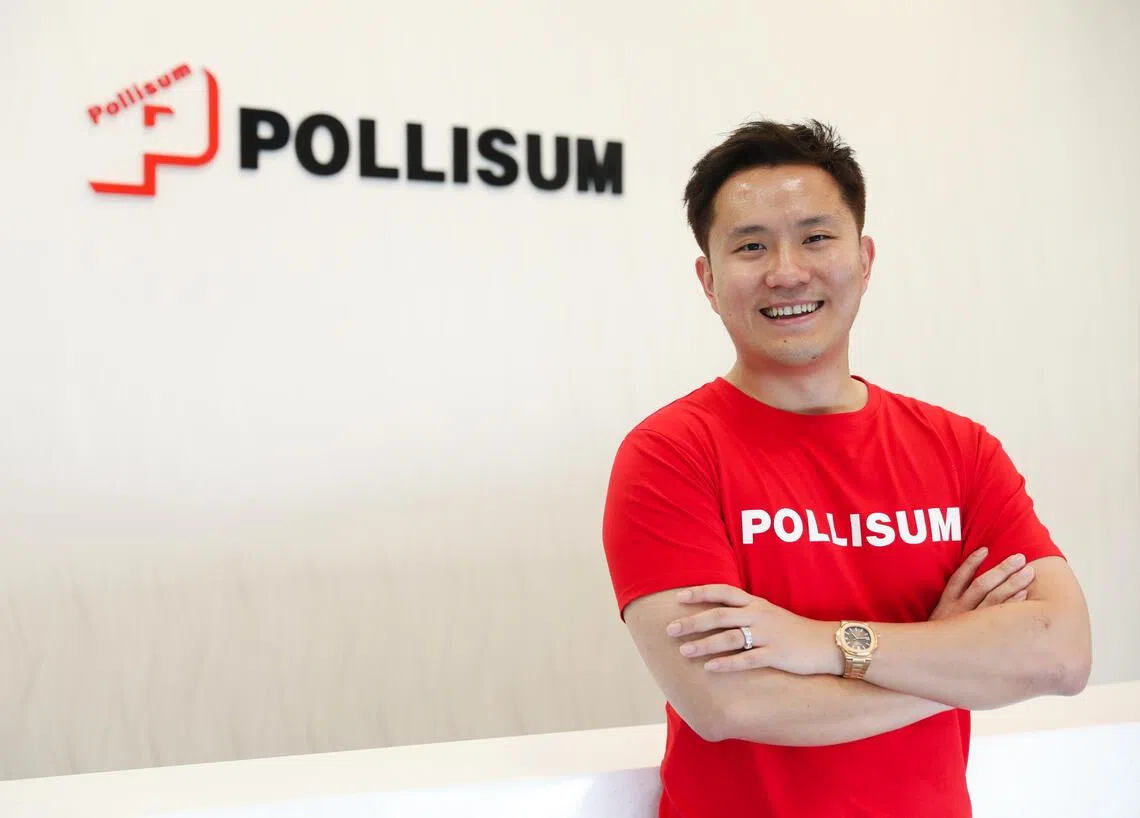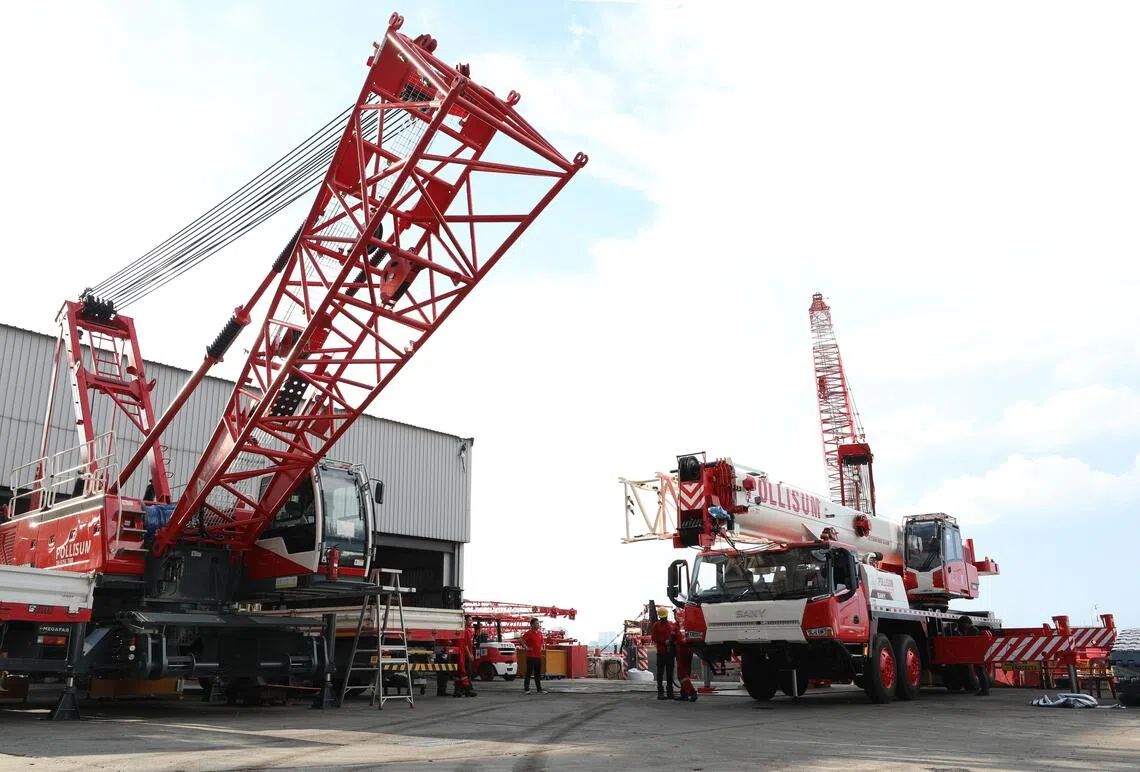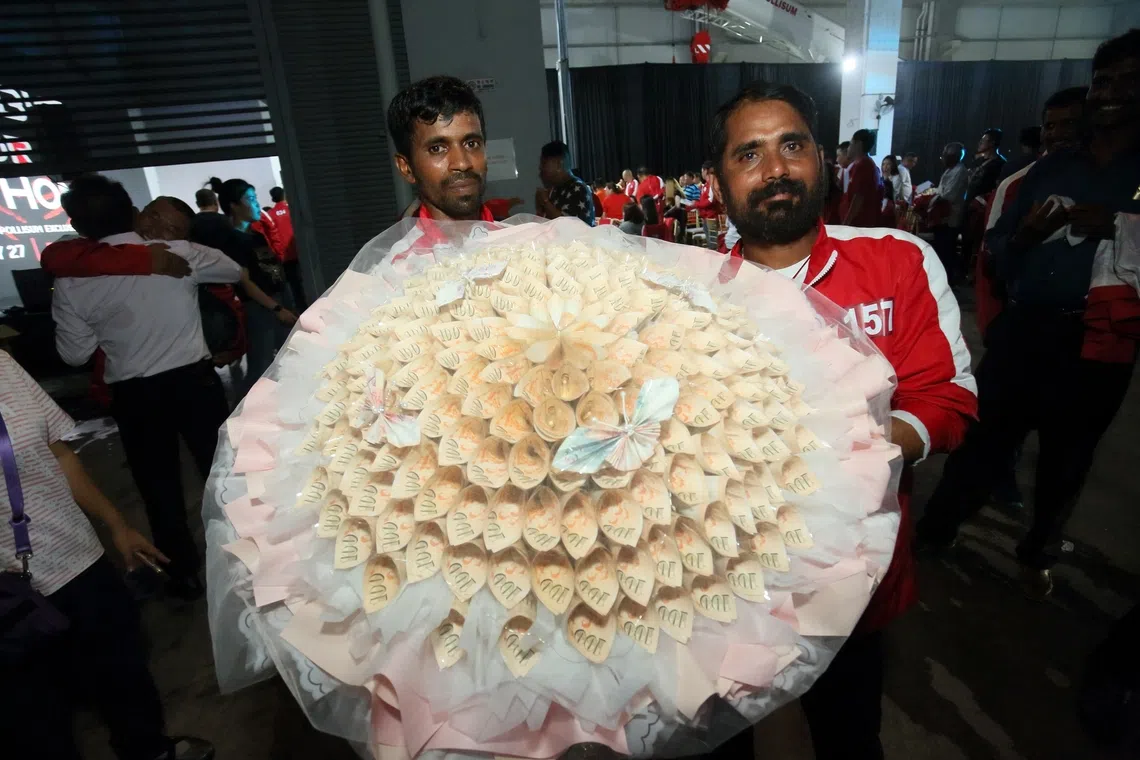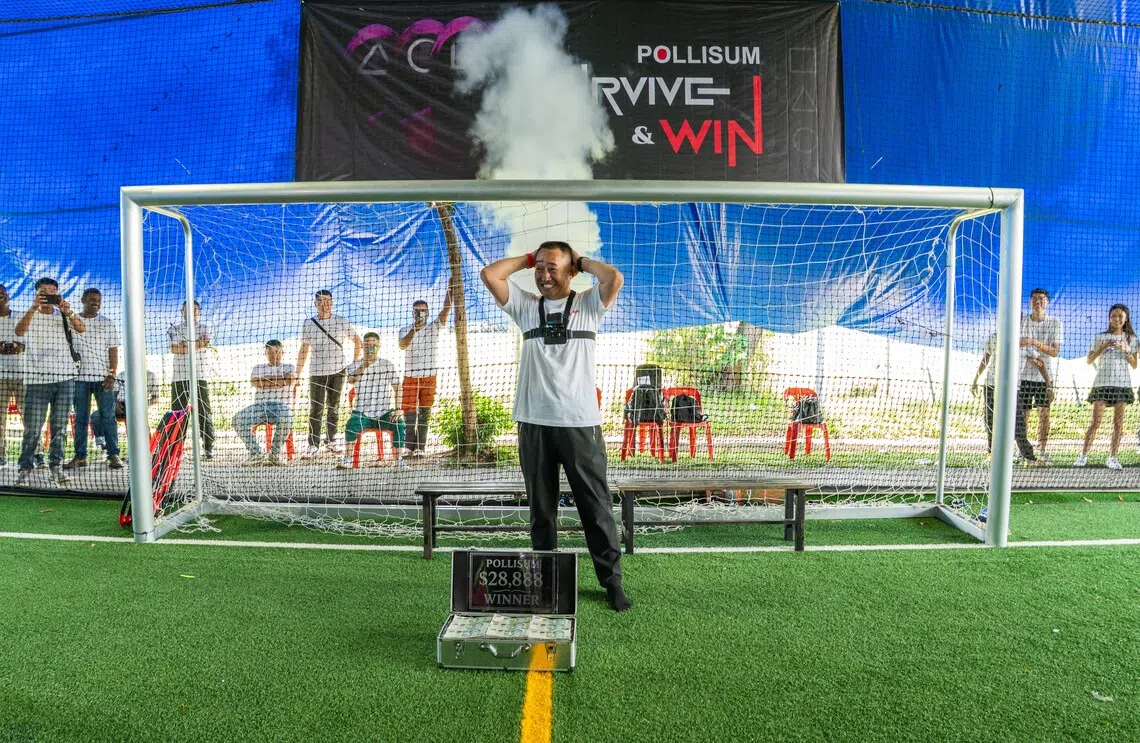Ambition lifts Pollisum to new heights – and perhaps even new shores
The group’s focus is on growing market share in Singapore and wooing strategic investors before venturing overseas

[SINGAPORE] In the early 1980s, two friends started an aquarium business, combining the Chinese character bao for blessing or protection with one from each of their names – Li and San – to create Pollisum. The venture ended after a storm washed away all their fish, but the name lived on with the latter’s founding of a crane mechanical repair company.
More than four decades on, the home-grown firm has carved a space for itself in crane rental, heavy transport, maritime logistics and services, as well as steel structure fabrication.
Its end-to-end crane-leasing services come complete with site assessments, certified operators and rigging crews; it also offers heavy-haulage transport options such as trailers, as well as cross-border services and the arrangement of police escorts for oversized cargo.
On the marine front, the group operates tugboats for towage or to assist vessels in berthing and unberthing, and offers barging services. It is also involved in the fabrication of lifting frames, spreader beams, waterstop end plates and circular water silos.
Today, Pollisum owns a fleet of more than 270 cranes and prime movers, and hires a workforce of nearly 400 employees.
It has contributed to major projects including the Thomson-East Coast Line, the Jurong Region Line, Resorts World Sentosa, Marina Bay Sands and, soon, Changi Airport’s Terminal 5.
Navigate Asia in
a new global order
Get the insights delivered to your inbox.
It is now run by chief executive Chris Ang, 38, who took over the reins from his father Ang Ka San, 78, who is also the group’s president. His mother, Julia Tai, 63, is executive chairman, while his sister, Angel, is chief administrative officer.
Father’s legacy, son’s duty
The younger Ang may be the founder’s son, but he had to earn his stripes – and the employees’ respect.
Admitting that he had been a poor student and a “slacker” in his early 20s – a character trait that left him picked on in the army, Ang told The Business Times: “The bullying changed my thinking a lot. From then on, I decided that everything I did, I would strive (to do) my best.”
SEE ALSO

He got his act together and, in 2016, the accounting and finance graduate left his job at professional services firm PwC at his father’s nudging to join Pollisum. Ang, then 29, received his first company name card – listing him as a management intern.
Two years later, he moved up the ranks to become a business development manager handling sales, before stepping up as the executive director in 2020 and chief executive in 2025.
“I really started from the ground up, working overtime and on weekends,” he told BT, noting that long-time employees who worked for his father struggled to respect and fall in line with the second generation.
“For them to really believe and work even harder for you, it’s tough. The employees need to see that the new management can really bring them (just as) far and even further than they could ever imagine,” he said.
And prove himself he did.
Shortly after he joined, his parents acquired a loss-making Malaysian transport company, and he was put in charge of it. He revamped its operations – leasing in Malaysia was no longer serving the company well, so he started providing transport services to Singapore instead. He then phased out the old fleet that was breaking down week after week.
In a year-and-a-half, he brought the bleeding entity to a break-even.
Ang was not done. He turned his attention to an underutilised fleet that had been parked in Pollisum’s yard for months and began knocking on crane sellers’ doors to do trade-ins.
He then took a leap of faith on Chinese cranes around 2019.
Though Pollisum, like most Singaporean leasing companies in the past, used to shun affiliation with cranes from China, Ang noticed around the pre-pandemic period that Chinese cranes were entering the market – and at half the price of their European peers. He spoke with several pioneers who had gone ahead with the Chinese cranes and, with their assurance, decided to purchase a few.
Then the pandemic hit, but construction recovered soon enough and new jobs kept coming in for Pollisum, said Ang.
The group was aggressively buying cranes, yet still hit a bottleneck as sales grew. Ang then initiated a cross-hire system with other small players, creating a network of more than 10 companies that leased their fleet – some did this for as much as 90 per cent – to Pollisum.
Over the years, Pollisum’s fleet almost trebled under his leadership, growing from around 100 cranes when he joined to more than 270 currently.
“The staff started to believe in this momentum,” he said.

Leading with heart
Ang also turned to incentives and overseas trips to strengthen his relationships with his team members and give back to them.
He recalled how he, shortly after joining, sent one of the company’s long-serving operations managers on a work trip to Europe, fulfilling a lifelong dream of hers and improving their working relationship.
The way Ang sees it, he wants Pollisum to be known as a company that not only doles out salaries, but also one run by a team that goes above and beyond to reward its employees.
The practice continues to this day.
At its dinner-and-dance event two years ago, the company gave out a total of S$100,000 in prize money. The night took the Internet by storm after a visibly touched migrant employee fell to his knees after he won an S$18,888 cash bouquet – a sum equivalent to one-and-a-half years of his salary.

The rigger and signalman, who hails from Tamil Nadu, supports 15 family members back home – his wife, three children, in-laws and his two late brothers’ wives and seven children. The money went towards building a family home in India and funding the children’s education.
Last year’s celebration, held in Batam, coincided with Father’s Day – and Pollisum surprised one of its Chinese migrant lorry crane drivers by flying in his wife and his then two-year-old daughter. The company also awarded the family an all-expenses-paid holiday.

This year, Pollisum gave out more than S$120,000 in total. Another Chinese migrant lorry crane driver took home S$28,888 in cash – equivalent to nearly nine months of his salary.

The way Ang sees it, it is not just about caring for the employees.
More importantly, he wants them to feel pride when talking about the company.
One of the ways he does so is by issuing each employee – whether a crane attendant, welder or storeman – a digital business card and, soon, a physical wooden name card, enabled with near field communication technology.
Everything is created in-house, said Ang, right down to the hard-coded employee details. Pollisum even invested in its own laser printer, initially experimenting with metallic cards before switching to wood when the metal proved too prone to bending.
He also gave each employee special titles: Crane attendants are known as crane operations associates; storemen as inventory specialists; and welders as welding technicians. The receptionist holds the designation of guest relations associate.
And, when Pollisum’s employees share their business cards with others, they may elicit reactions of awe – and the workers walk away feeling proud of the company behind them, said the chief executive.
Growth and expansion plans
As far as Ang is concerned, the group’s focus is now on doing what it does best in Singapore, where it is looking to increase its market share and woo strategic investors, before venturing into overseas markets.
“We’re looking at private equity firms or, if not, strategic investors (such as) big construction companies or even crane companies from another country,” he said, clarifying that it would not be about selling the company or exiting fully.
Rather, such investments will propel Pollisum’s growth, he added. The group intends to maintain its compound annual growth rate at 30 per cent for the next five years with the help of investors.
It is also exploring potential mergers and acquisitions with companies with which it has synergies, whether upstream or downstream, keeping an eye on those with strong earnings before interest, taxes, depreciation and amortisation multiples and margins.
On its potential overseas expansion, Ang said: “We are looking for countries with stable governments and policies, very strict requirements in crane regulations and potential opportunities that accept Chinese cranes.” Australia was a potential option, he added.
Asked whether a listing is on the cards, the chief executive replied that it is an option, but not the only one, and might be a more attractive course of action at a later stage.
And while Pollisum started as a family business, it does not necessarily have to stay that way, said Ang.
He has a four-year-old daughter, whom he does not want to pressure or force to take up the family business, especially if she has no passion for it. “Legacy needs to be earned and cannot be taken for granted,” he said. “Whoever has the best capabilities should continue (the business).
On what the win means to Pollisum, Ang said that being recognised by one of the most prestigious accolades in the small and medium-sized enterprise space inspires confidence and trust among his employees that the company achieves what it sets out to do.
“You have to win all these small battles in order to win the big war,” he said.
For him, the larger fight is to build Pollisum’s global footprint and ultimately establish the group as a market leader in the crane industry – or, to borrow a Chinese idiom, stand out among chickens as would a tall crane.
Decoding Asia newsletter: your guide to navigating Asia in a new global order. Sign up here to get Decoding Asia newsletter. Delivered to your inbox. Free.
Copyright SPH Media. All rights reserved.





